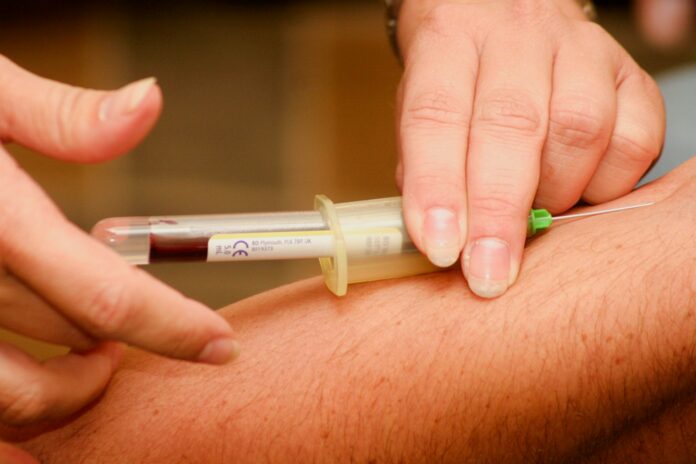Colin and Jan Smith, whose son died from contaminated blood, seek accountability and recognition from the upcoming report.
Colin and Jan Smith have carried the weight of grief and anger for decades after their son, also named Colin, died at the age of seven in January 1990. His life was cut short by complications from Hepatitis C and AIDS, contracted through contaminated blood products used to treat his haemophilia. As the long-awaited report into the infected blood scandal is set to be released on Monday, the Smiths hope it will finally bring accountability and justice.
Colin Sr. and Jan recount the painful memories and their son’s suffering. In their Newport home, they keep a small suitcase filled with Colin Jr.’s belongings, including a sky blue blanket that still carries his scent, favourite toys, and artwork. Colin Jr.’s life was marked by frequent hospital visits and painful treatments, unbeknownst to his parents, involving Factor VIII—a blood product made from plasma sourced from high-risk donors in the U.S.
Embed from Getty ImagesColin Jr.’s health deteriorated rapidly, and the physical effects of the virus were devastating. His parents recall how he became so fragile that they had to handle him with extreme care to avoid causing him pain. The Smiths were horrified to learn from the Infected Blood Inquiry that their son might have been used in secret medical trials due to his status as a previously untreated haemophiliac.
The stigma surrounding HIV and AIDS compounded their suffering. When Colin Jr.’s diagnosis became known, the family faced relentless harassment and discrimination. Their home was vandalized with hate messages, and they were ostracized by their community. Despite this, they brought Colin Jr. home for his final Christmas, defying medical advice to let him die in the hospital. Colin Jr. passed away peacefully at home, surrounded by his family.
The Smiths have fought tirelessly for justice and recognition. The upcoming report by Sir Brian Langstaff represents a crucial milestone in their journey. Colin Sr. seeks accountability for those responsible, expressing the deep guilt he feels for entrusting his son to the medical system that ultimately failed him. “I gave my son over to his killers, you know, and I can’t get to grips with that,” he says.
For Jan, the report is about more than accountability; it is about reclaiming her son’s dignity and ensuring his story is remembered. She wants an official apology and recognition of the injustice they endured. “I want people to recognize my son. And I want to be able to go to the cemetery and say we’ve done it. And you’ve done it,” she states. “I want my son to have his name back. His name is Colin John Smith. And that’s what I want people to remember.”
Analysis:
The Infected Blood Inquiry’s forthcoming report is a pivotal moment for the thousands of families affected by this tragic scandal. Politically, it places significant pressure on the UK government to address past failures in the healthcare system and ensure accountability for the decisions that led to the widespread distribution of contaminated blood products. The report’s findings could lead to legal actions and policy changes to prevent such incidents in the future.
Economically, the scandal has already prompted substantial financial implications, including compensation for victims and the costs associated with the inquiry itself. Future reparations and healthcare provisions for affected families will require an ongoing financial commitment from the government, reflecting a broader responsibility to rectify historical injustices.
From a sociological perspective, the stigma and discrimination faced by the Smith family and others highlight the deep-seated prejudices and misunderstandings about HIV and AIDS that existed during the 1980s and 1990s. Addressing these issues within the inquiry’s findings can promote a better understanding and support for affected individuals, fostering a more inclusive and compassionate society.
Psychologically, the trauma experienced by families like the Smiths underscores the long-term impact of medical negligence and public stigma. Comprehensive mental health support for survivors and their families is essential for healing and closure. Acknowledging the emotional and psychological toll of the scandal is crucial in delivering justice and support.
The ethical dimensions of the inquiry are profound, raising questions about medical experimentation and informed consent. The alleged use of patients in secret trials without their knowledge or consent represents a grave breach of medical ethics. The report must address these ethical violations and recommend safeguards to protect patients’ rights and ensure transparency in medical research.
Finally, the report’s impact on public health policy could be significant. It is likely to lead to stricter regulations on blood products and greater oversight of medical treatments. Learning from the failures of the past is essential to prevent similar tragedies in the future and restore public trust in the healthcare system.
In conclusion, the Infected Blood Inquiry’s report is expected to provide a comprehensive account of the scandal, highlighting systemic failures and the need for accountability. For families like the Smiths, it represents a long-overdue recognition of their suffering and a step towards justice. The findings will likely influence policy, legal standards, and societal attitudes, ensuring that the lessons learned from this tragedy are not forgotten.
